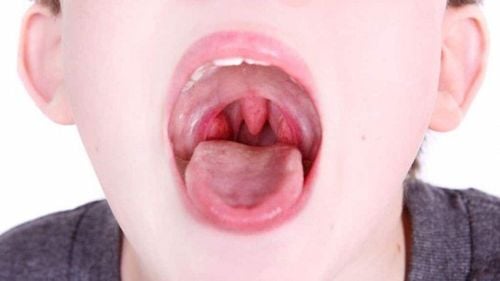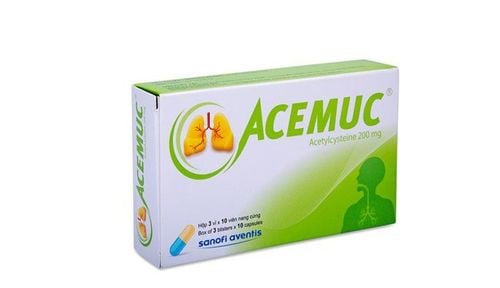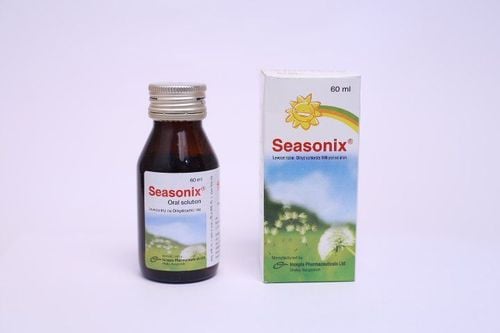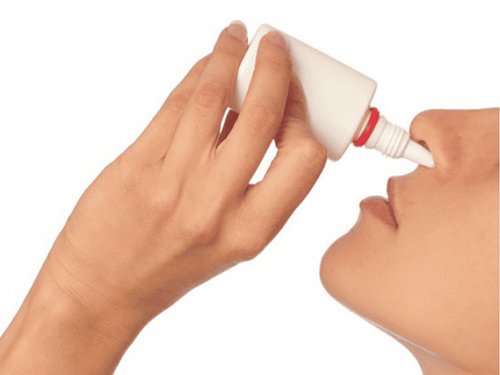This is an automatically translated article.
Newborns with sore throat can have many different causes, depending on the cause for prompt intervention and treatment. The following article will provide parents with signs, causes and notes when children have sore throat.
1. Causes of sore throat
Sore throat has many different causes, it can be the result of an infection or it can be caused by one of a number of diseases such as cold or flu viruses, measles , chickenpox and cancer lung .
In fact, the most common cause of a sore throat is a viral infection. If your child has tonsillitis, it means the tissue on either side of his or her throat is infected with a virus or bacteria. The most common bacteria that causes a sore throat is strep throat, but this is rare in babies and toddlers. Another bacterial infection that can cause a sore throat is whooping cough.
In addition, airborne irritants such as cigarette smoke, pet dander, dust, ragweed pollen, grasses and trees can also make a child's throat sore and cause similar symptoms. A cold is called allergic rhinitis or hay fever. Even hot and dry climates can cause a sore throat in babies, especially if they tend to sleep with their mouths open. If this is the case, your baby's mouth will be dry when he wakes up, but he'll feel better as soon as he gets a drink of water afterward.
You should also watch out for lesions in the mouth caused by gingivitis because it can also cause sore throats for example children with hand, foot and mouth disease, thrush or teething.

Trẻ bị thủy đậu có thể dẫn đến viêm họng
2. Newborn with sore throat, what to do?
If your child has sores in his mouth, take him or her to the doctor to have them checked, because a bacterial infection can spread and damage other parts of the body if left untreated. In addition, your child's throat should also be examined if you are concerned that your child's sore throat is not simply due to dryness or minor irritation.
You should also take your child to the doctor right away in the following cases:
The child's throat shows signs of infection (bright red, swollen, or has pus) The child cannot swallow easily or the child is breathing fast. The child has anorexia, signs of dehydration, excessive drooling, stiff neck or excessive irritability. If you notice that your child's sore throat is so mild that you don't need to see a doctor, keep an eye on your child and don't let the condition persist for more than a week. You should take your baby to see a doctor if the child is under 3 months old and has a fever of 38°C or higher, the child is 3 to 6 months old and has symptoms of a sore throat and fever up to 38.3°C or if younger than 6 months and fever is up to 39.4 degrees Celsius.

Trẻ có thể bị viêm họng kèm sốt
3. Is a sore throat an emergency?
Very rarely a child has a sore throat that requires emergency care. The only emergency is possible with epiglottitis, but it's very rare thanks to the Hib vaccine. An infection of the lining of the pharynx prevents food and fluids from going down the windpipe. Epiglottitis makes it difficult for children to breathe as well as to swallow and quickly turns to fever (with a temperature above 38.3 degrees Celsius), shortness of breath and often drooling. If your child has these symptoms, call the doctor right away for prompt help.
If you suspect that your child has epiglottitis keep the child sitting up and do not try to check his or her throat, do not give him food or drink as it can make breathing more difficult. Children with epiglottitis need to be taken to the emergency room for urgent treatment.

Khi trẻ bị viêm nắp thanh quản cần đưa đến gặp bác sĩ
4. If the child has an infection, how is it treated?
For most viral infections, no treatment is available or necessary because a child's immune system can generally overcome the virus within a week and a child recovers quickly if Rest and drink plenty of water.
If the doctor suspects that the sore throat is caused by a bacterial infection, a sample of cells will be taken from the throat to be tested. In most cases, your child will have a rapid strep test that provides results within 10 minutes. If the test is negative, the sample will usually be sent for a culture for one to two days to recheck the results.
If your child has a bacterial infection (such as strep), the doctor will prescribe antibiotics for the child. You should pay attention to follow the instructions for giving medicine to your child and do not stop using antibiotics too soon because bacteria can accumulate and recur quickly in a more serious form.
5. How contagious is sore throat?
Bacterial and viral infections are very contagious. Be proactive by washing your child's hands often, and if they're old enough to eat solid foods, make sure no one shares eating utensils, cups or toothbrushes with them. Wash your hands often, especially after changing diapers.
The doctor will tell you the right time for your child to return to daycare, but in general, the child will need to be kept at home until the condition improves and if the child has a sore throat due to a bacterial infection Your child will be on antibiotics for at least 24 hours.

Cho trẻ rửa tay thường xuyên để tránh nhiễm virus gây bệnh
6. How to soothe a child's sore throat?
If the child is old enough to be able to eat solid foods and drink warm drinks like tea or broth, give them a try as it can ease the pain. However, only add honey to tea when a child is at least a year old because honey can contain botulism spores that can develop in a child's small intestine.
Children over 12 months can also enjoy some apple juice. However, avoid citrus juices as they can make a child's throat worse.
Remember that it's important to keep your child hydrated, so even though it may be painful to swallow, your child needs plenty of fluids, especially if he has a fever. For babies, you can give them breast milk or formula. If your child has trouble swallowing, try giving them smaller amounts than usual.
If the baby is really upset, ask the doctor about giving a pain reliever like Acetaminophen for babies or Ibuprofen if the baby is 6 months or older. Never give aspirin to a child because it has been linked to a rare but serious condition called Reye's syndrome.
Try using a nebulizer or humidifier in your child's bedroom to humidify the air and soothe his or her throat. Make sure to keep the filters clean, or they can create more germs into the air.
If your child has a severe infection, you may have to take him or her to the hospital for a few days to get injections or intravenous fluids.
Seasonal change is the time when children are most susceptible to sore throat, so you should keep your baby's nose and throat clean every day, and feed them lots of foods to help strengthen their resistance. If your baby has a sore throat, you can refer to how to take care of your baby to recover quickly in some of the articles below:
Instructions for taking care of children, preventing acute sore throats that are common in the changing seasons Instructions for taking care of children with nasopharyngitis Treatment and prevention of strep throat in children
Please dial HOTLINE for more information or register for an appointment HERE. Download MyVinmec app to make appointments faster and to manage your bookings easily.
Reference source: babycenter.com













